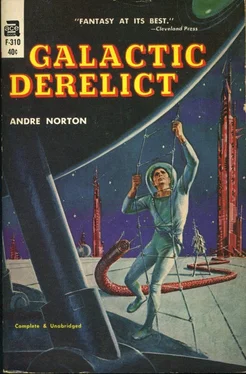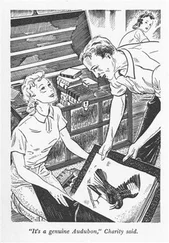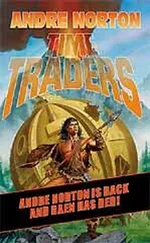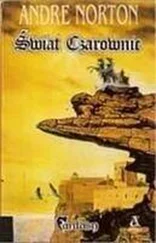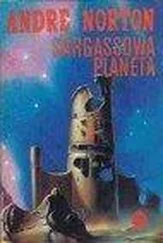Andre Norton
GALACTIC DERELICT
HOT—it sure was stacking up to be a hot one today. He’d better check on the spring in the brakes before the sun really boiled up the country ahead. That was the only water in this whole frying pan of baking rock—or was it?
Travis Fox hitched forward in his saddle to study the pinkish yellow of the bare desert strip between him and that faint, distant line of green juniper against the buff of sagebrush which marked the cuts of the brakes. This was a barren land, forbidding to anyone not native to its harshness.
It was also a land in which time was frozen into one color-streaked mold of unchanging rock and earth, and in that it was probably now unique upon the rider’s planet. Elsewhere around the world deserts had been flooded, through man’s efforts, with sea water freed of its burden of salt. Ordered farms beat ancient sand dunes into dim memories. Mankind was fast becoming no longer subject to the whim of weather or climate. Yet here the free desert remained unaltered because the nation within which it lay was still rich enough not to need all of its soil under cultivation.
Someday this, too, would be swept away, taking with it the heritage of such as Travis Fox. For five hundred years, or perhaps close to a thousand now—no one could righdy say when the first Apache clan had come questing into this territory—these canyons and sand wastes, valleys and mesas had been dominated by a tough, desert-born breed who could travel and fight, and live off bleakness no other race dared face without supplies laboriously transported. His ancestors had waged war which lasted almost four centuries across this country. And now the survivors wrested a living from the same region with a like determination.
That spring in the brakes… Travis’ brown fingers began to count off seasons in taps on his saddle horn. Nineteen… twenty… This was the twentieth year after the last big dry, and if Chato was right, that meant the water which should be there was due for a periodical failure. And the old man had been correct in his prediction of an unusually arid summer this year.
If Travis rode straight there to find the spring dry, he’d lose most of the day, and time was important. They had to move the breeding stock to a sure water supply. On the other hand if he cut back into the Canyon of the Hohokam on just a hunch and was wrong—then Whelan would have every right to lay into him for being a fool. Whelan stubbornly refused to follow the Old Ones’ knowledge. And in that his brother was himself a fool.
Travis laughed softly. The White-eyes—deliberately he used the old warrior’s term for a traditional enemy, saying it aloud, “Pinda-lick-o-yi”—the White-eyes didn’t know everything. And a few of them were willing to admit it once in a while.
Then he laughed again, this time at himself and his own thoughts. Scratch the rancher—and the Apache was right under the surface of his sun-dried hide. Only there was a bitter note in (hat second laugh and Travis booted his pinto into n’lope with more force than was necessary. He didn’t care to follow the trail of those particular thoughts. He’d make for the place of the Hohokam and he’d be Apache for today; there was nothing to spoil that as his other dreams had been spoiled.
Whelan thought that if an Apache lived like the White-eyes, and set aside all the old things, then he would gain all their advantages. To Whelan there was nothing good in the past, and even to consider the Old Ones, what they did and why they did it, was a foolish waste of time. Travis bit again on disappointment, to find it as fresh and bad-tasting as it had been a year earlier.
The pinto threaded a way between boulders along the course of a dried stream bed. Odd that a land now so arid could carry so many signs of past water. There were miles of irrigation ditches used by the Old Ones, marking the sun-baked pans of open land which had not known the touch of moisture for centuries. Travis urged his mount up a sharp slope and headed west, feeling the heat bore into his straight back through the single layer of faded shirt fabric.
He doubted if Whelan knew of the Canyon of the Hoho-kam. That was one of the things from the old days, a story preserved by such as Chato. And there were now two kinds of Apache—Chato and Whelan. Chato denied the existence of the White-eyes, living his own life behind a shutter which he dropped between him and the outside world, the world of the whites. And Whelan denied the existence of the Apache, being all white with an effort.
Once Travis had seen a third way, that of bending the white man’s learning to blend with Apache lore. He thought he had discovered those who agreed with him. But it had all gone, as quickly as a drop of water poured upon rock surface here would vanish. Now he tended to agree with Chato—and, knowing that, Chato had freely given him information Whelan did not have, facts concerning Whelan’s own range land.
Chato’s father—again Travis counted, fingertip against saddle horn—why, Chato’s father would be a hundred and twenty years old if he were alive today! And he had been born in the Hohokam’s valley while his family were hiding out from the blue-coated soldiers.
Chato had known of the lost canyon, had guided Travis to it when he was so small he could barely grip a horse’s barrel with his short legs. And he had returned there again and again through the years. The houses of the Hohokam had intrigued him, and the spring there never failed. There were pifions with a rich harvest of nuts to be gathered in season, and some stunted fruit trees still yielding a measure of fruit. Once it had been a garden; now it was a hidden oasis.
Travis was working his way into the maze of canyons which held the forgotten trail of the Old Ones when he heard that hum. Out of instinct he drew rein, knowing that he was in the concealing shadow of a cliff wall, and glanced skyward.
“’Copter!” He said it aloud in sheer surprise. The ageless desert country had claimed him so thoroughly during the past few hours that sighting that very modem mode of travel came almost as a shock.
Could it be Whelan, checking up on him? Travis’ mouth tightened. But when he had left the ranch house at sunup, Bill Redhorse, Chato’s grandson, had been working on the engine of the ranch bus. Anyway, Whelan couldn’t waste fuel on desert coasting. With the big war scare on again, rationing had tightened up and a man kept his copter for emergencies, working horses again for daily work.
The war scare… Travis thought about it as he watched the strange machine out of sight. Ever since he could remember there had been snapping and snarling in the newspapers, on the radio, on the TV screen. Little scrimmages bursting out, smoldering, talk and more talk. Then, some months back, something queer had happened in Europe—a big blast set off in the north. Though the Reds had not explained what had happened and clamped down tight all their screen of secrecy, rumor had it that some kind of a new bomb had gone wrong. All this might be only preliminary to an out-and-out break between East and West.
And the VIPs chose to believe that was true. There was a tightening up of regulations all along the line, a whispering of trouble to come. New fuel rationing slapped on, a tenseness in the air…
Out here it was easy enough to shove all that stuff out of one’s mind. The desert dried out to nothing the bickering of men. These cliffs had stood the same before the brown-skinned men of his race had trickled down from the north. They would probably be standing, though perhaps radioactive, when the White-eyes blasted both white and brown men out of it again.
The sight of the ’copter had triggered memories Travis did not like. He continued to wonder, as the machine disappeared in the direction he himself was following, what its mission was here.
Читать дальше
